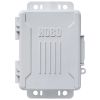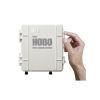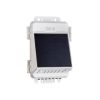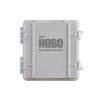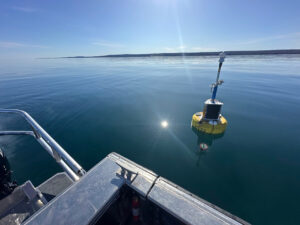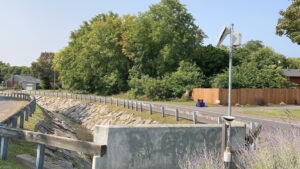Onset ECH2O 10HS Soil Moisture Smart Sensor
Features
- Provides data directly in volumetric water content
- High-frequency (70 MHz) circuit provides good accuracy even in high-salinity and sandy soils
- Compatible with Onset stand-alone and web-based weather stations
- Free ground shipping
- Expedited repair and warranty service
- Lifetime technical support
- More
Overview
The Onset ECH2O 10HS soil moisture smart sensor measures a large 1-liter volume of soil, providing a more accurate picture of average soil moisture. The sensor integrates the field-proven 10HS Sensor and a 12-bit A/D, providing ±3% accuracy in most soil conditions and ±2% accuracy with soil-specific calibration.
Mechanics
The 10cm probes measure soil moisture over a larger volume of soil, helping to average out any soil variability. Readings are provided directly in volumetric water content. The sensor's high-frequency design minimizes salinity and textural effects and gives it a wide measurement range.
Measurement range in soil: 0 to 0.570 m³/m³ (volumetric water content)
Accuracy:
±0.033 m³/m³ (±3.3%) typical 0 to +50°C (+32° to +122°F) for mineral soils up to 10 dS/m
±0.020 m³/m³ (±2%) with soil specific calibration
Resolution: 0.0008 m³/m³ (0.08%)
Soil probe dimensions: 160 x 32 x 2 mm (6.5 x 1.25 x 0.08 in.)
Weight: 190 grams (6.7 oz)
Decagon probe part no.: 10HS
Sensor operating temperature:
0° to +50°C (+32° to +122°F). Although the sensor probe and cable can safely operate at below-freezing temperatures (to -40°C/F) and the smart sensor tube (the white portion of the sensor cable that houses the electronics) can be exposed to temperatures up to +70°C (+158°F), the soil moisture data collected at these extreme temperatures is outside of the sensor's accurate measurement range. Extended temperatures above +50°C (+122°F) will decrease logger battery life when using for the S-SMD-M005 smart sensor.
Volume of influence: 1 liter (33.8 oz)
Sensor frequency: 70 MHz
Bits per sample: 12
Number of data channels: 1
Measurement averaging option: No
Cable length available: 5 m (16 ft)
Length of Smart Sensor network cable: 0.5 m (1.6 ft)
In The News
Sargassum Surge: How Seaweed is Transforming our Oceans and Coastal Ecosystems
Until recently, Sargassum –a free-floating seaweed–was distributed throughout the Sargasso Sea , the north Caribbean Sea, and the Gulf of Mexico. But in the space of a decade, this seaweed has, as one scientist remarks , “Gone from a nonfactor to the source of a terrible crisis.” Driven by climate change, anomalous North Atlantic Oscillation in 2009-2010 and a glut of anthropogenic pollutants, sargassum has proliferated. Seasonally recurrent mats as deep as 7m now bloom in the “Great Atlantic Sargassum Belt” (GASB), which covers areas of the Atlantic from West Africa to the Caribbean Sea and Gulf of Mexico. Every year, millions of tons wash up along the shores of more than 30 countries . Dr.
Read MoreGreat Lakes Research Center: Designing Targeted Monitoring Solutions
According to the National Oceanic and Atmospheric Administration ( NOAA ), the Great Lakes have more miles of coastline than the contiguous Atlantic and Pacific coasts combined and contain 20 percent of the world's freshwater, making it a critical region to protect and conserve. Continuous monitoring and data-informed resource management are key components of managing waters in the region. Hayden Henderson, a research engineer with the Great Lakes Research Center (GLRC), designs and deploys monitoring platforms throughout the Great Lakes. With a background in environmental engineering, Henderson enjoyed the challenge of creating systems and making them work to obtain difficult, remote measurements.
Read MoreMonitoring Meadowbrook Creek: Real-Time Data Collection in an Urban Creek
Meadowbrook Creek in Syracuse, New York, has been monitored by Syracuse University (SU) faculty and students for over a decade. Originally established by Dr. Laura Lautz in 2012, the early years of the program focused on collecting grab water samples for laboratory analysis and evaluating the impact of urban land use, human activities, and natural processes on water resources. Tao Wen , an Assistant Professor in SU’s Department of Earth and Environmental Sciences, took over the program in 2020 and upgraded the existing systems to include 4G modems that allowed for real-time data viewing. [caption id="attachment_39339" align="alignnone" width="940"] An overview of the Fellows Ave monitoring station along Meadowbrook Creek.
Read More








